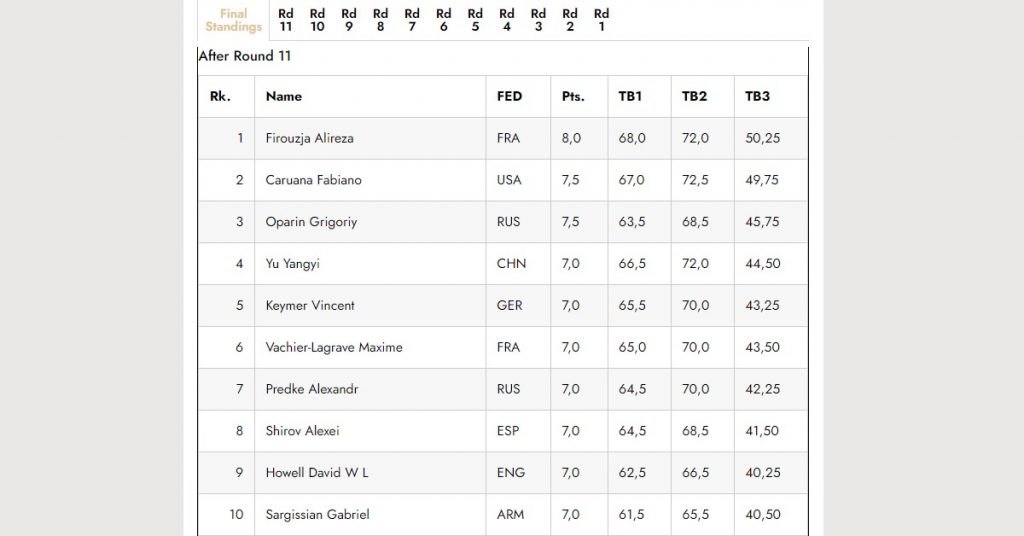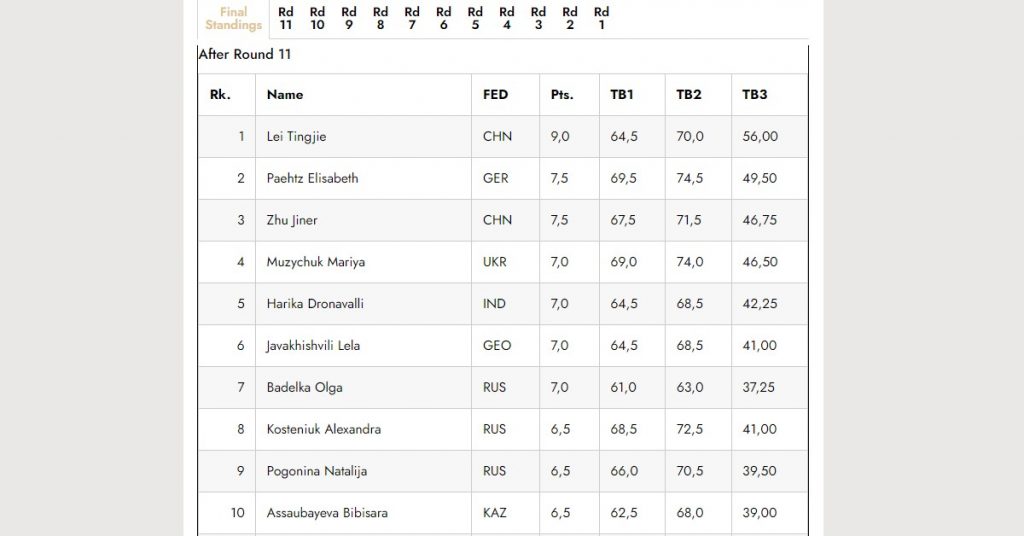Alireza Firouzja and Lei Tingjie are the winners of the 2021 FIDE Chess.com Grand Swiss and the inaugural Women’s Grand Swiss
After a draw in the final round game with Russia’s Grigoriy Oparin, naturalised Frenchman Alireza Firouzja won the 2021 FIDE Chess.com Grand Swiss. With 8/11, he is half a point ahead of everyone else. With this victory, Firouzja also secured a prize of 70,000 USD as well as a pass for the 2022 Candidates tournament, which will determine the challenger for the title of the World Champion in chess.
In an interview immediately after the final round, Firouzja said that this was a very tough tournament and that he didn’t see himself as a big contender for the top place.
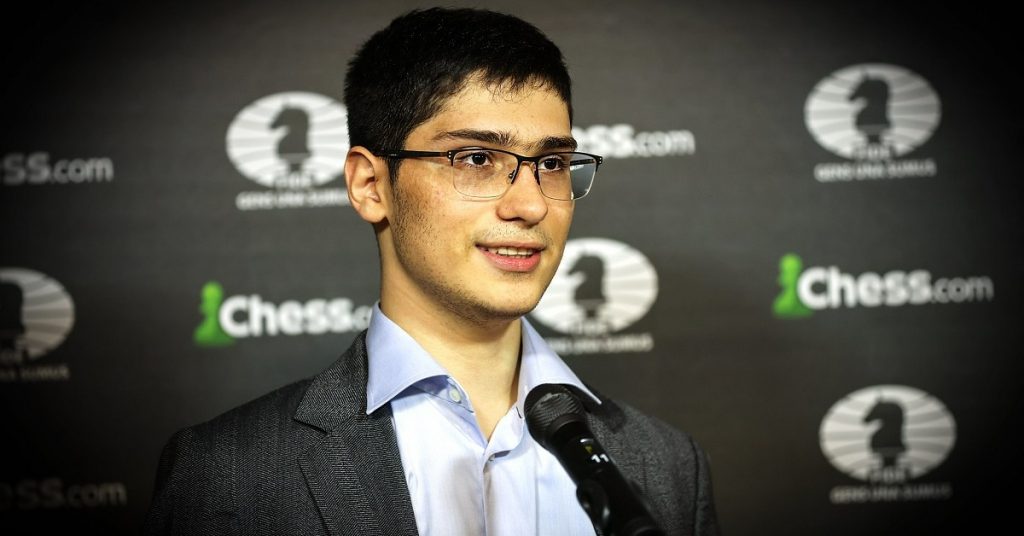
“Chess for me is a game I can never quit. When you learn chess, it’s finished – you go all the way, and even if you’re not a professional, you will be thinking about chess”, said Firouzja.
World number three and former contender for the title of World Champion, Fabiano Caruana, is second, with 7.5/11. Caruana took the second ticket for the 2022 Candidates tournament and also pocketed a prize of 50,000 USD. The third place – and 40,000 USD – went to Grigoriy Oparin of Russia, who also has 7.5 points but has a weaker tiebreak.
The three are followed by as many as 13 Grandmasters with seven points, in the following order: Yu Yangyi, Vincent Keymer, Maxime Vachier-Lagrave, Alexandr Predke, Alexei Shirov, David Howell, Gabriel Sargissian, David Anton, Anton Korobov, Samuel Sevian, Andrey Esipenko, Bogdan-Daniel Deac, and Vladislav Artemiev.
Those who won the 3rd to 8th place have all qualified for the 2022 Grand Prix series which will be held in Berlin and Belgrade in 2022.
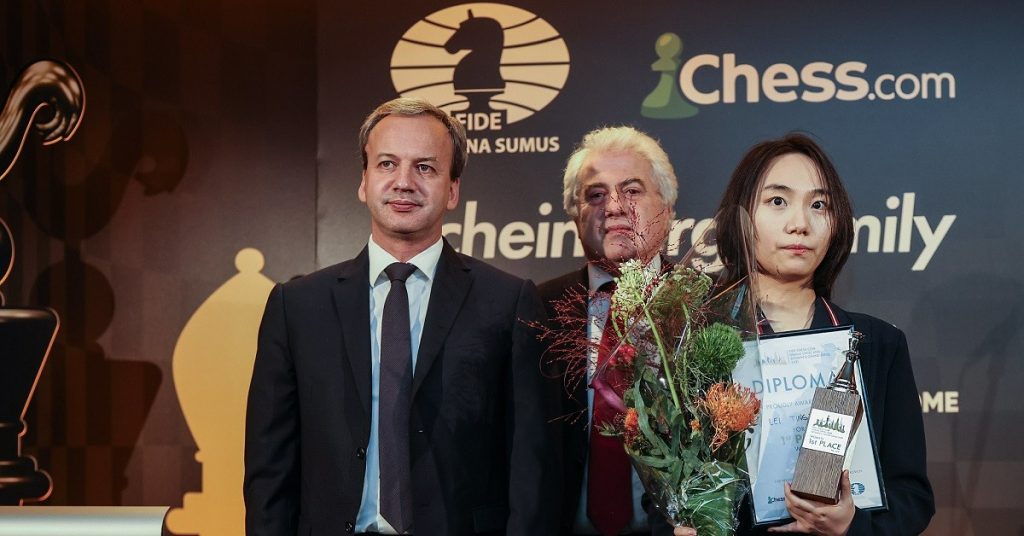
The inaugural Women’s Grand Swiss ended with a Chinese victory as Lei Tingjie claimed first place with nine points out of eleven games. The Chinese already knew she won the tournament the day before, having secured a 1.5 point advantage over everyone else in Round Ten. In the final round, she played a longer game and drew with compatriot Zhu Jiner. With this victory in the Grand Swiss, Lei has qualified for the 2022 Women’s Candidates tournament and has pocketed 20,000 USD in prize money.
The second and third places in the women’s tournament were shared by Elisabeth Paehtz of Germany (who also secured her final GM norm) and Zhu Jiner of China, who both have 7.5/11. The German came in second because of a better tiebreak.
With 7/11, four players share fourth to seventh place in the women’s section (in the following order): Mariya Muzychuk (the top seed in this tournament), Harika Dronavalli, Lela Javakhishvili and Olga Badelka.
The top-4 in the final standings – Lei Tingjie, Elisabeth Paehtz, Zhu Jiner, and Mariya Muzychuk – have qualified for the next women’s Grand Prix cycle.
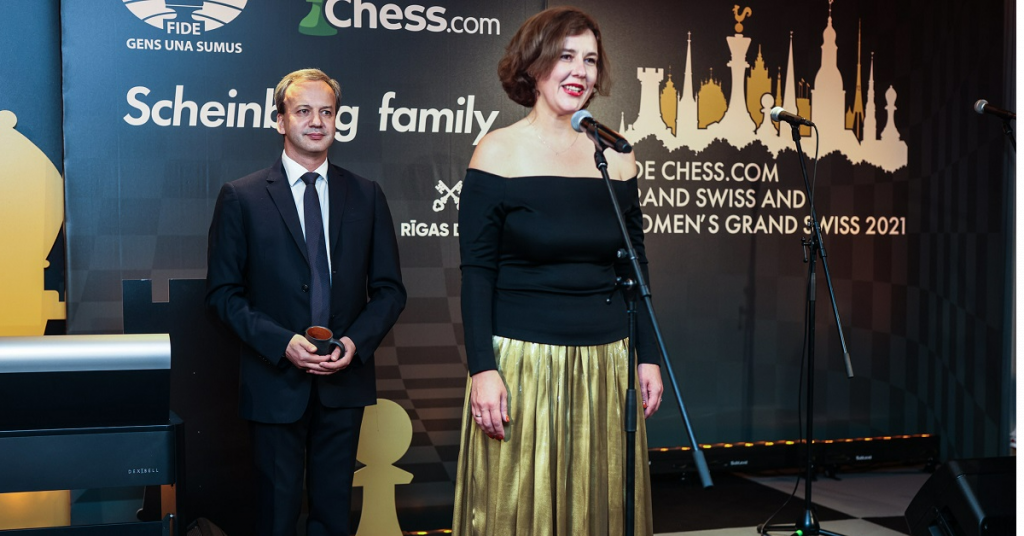
The Open Event
Alireza Firouzja started the final day with half a point ahead of the field. He needed a draw to punch hist ticket to the Candidates. His opponent Grigoriy Oparin was leading the white pieces and playing what was probably the most important game of his life so far. In order to qualify for the Candidates, Oparin had to win, given that he had one of the lowest tiebreak scores among the top players.
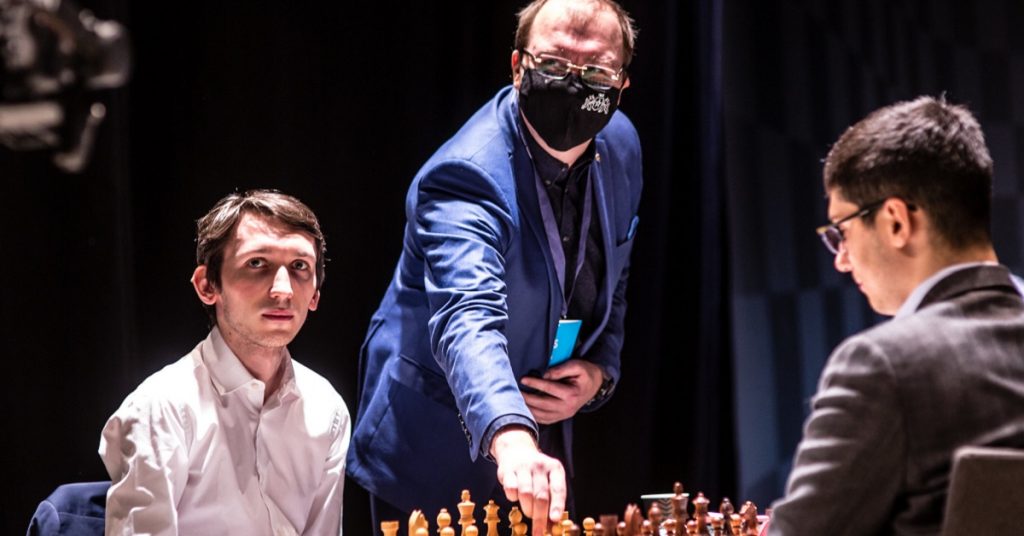
Oparin and Firouzja played only twice before: two online Blitz games, in 2018 and 2020, and the result is 1:1. This was, therefore, the first time they met in a propper, classical game.
In Ruy Lopez, Oparin played the anti-Berlin, which suggested he was looking for a more complex game. Firouzja’s basic goal was to exchange all the pieces on the board and steer the position to calm waters. To that end, he forced an exchange of several pieces on the board, and the middlegame was largely even. It was Oparin who decided not to force the position and opted for a repetition leading to a draw.
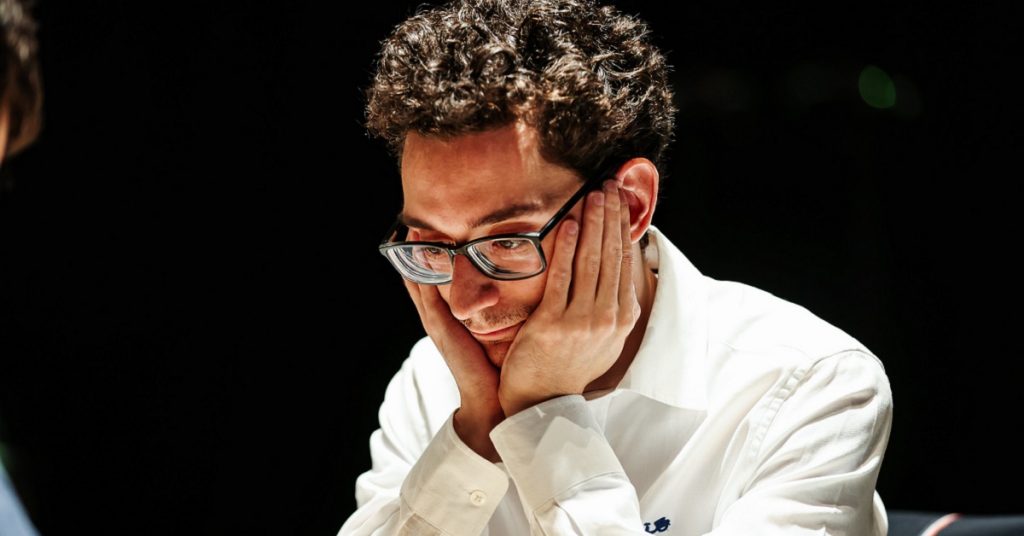
On board two, Fabiano Caruana was White against Alexandr Predke. With no losses, Caruana had a very solid tournament. Aside from Firouzja, Caruana was in the most comfortable position to secure the ticket for the Candidates. Following Firouzja’s draw, Caruana’s second place seemed closer, but it was still unclear – if Yu Yangyi won in his game, and the rest of the top boards ended in a draw, it would have been the Chinese and not the American who would have clinched the second place with the ticket for the Candidates.
The players blitzed the Ruy Lopez, rattling off 20 moves in the first 20 minutes. White emerged slightly better, but after the queen exchange the position became equal. With a timely pawn thrust e5-e4 Predke exchanged his e-pawn to the opponent’s c-pawn and created a free-runner on the a-file. That, however, did not change the evaluation of the position. Since neither side had clear chances, a draw was agreed on move 46.
In the post-game interview, Fabiano Caruana said he was slightly weaker against Predke, adding that the Russian was ‘super well prepared’. Caruana said he thought a draw secured his qualification to the Candidates, noting that the most dangerous game for him was the duel between Maxime Vachier-Lagrave and Yu Yangyi.
“I was very worried for both of them at some point. I was hoping for a draw, but Maxime’s position looked extremely suspicious, and near the end, I thought Yu Yangyi’s position was very dangerous”, said Caruana.
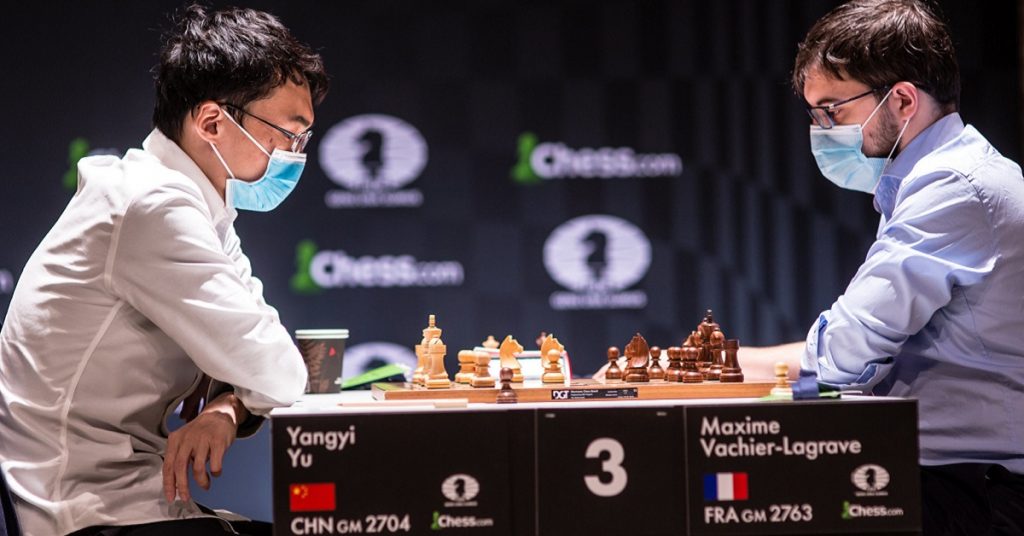
On board three, Frenchman Maxime Vachier-Lagrave played his favourite Najdorf Variation of the Sicilian against Yu Yangyi of China. As it often happens in this system, the opponents castled to the opposite wings and started pushing their pawns. Black was first to open files for a potential attack but White got a strong footing in the centre and snatched a weak d6-pawn. At this point, Maxim’s position looked dangerous, but Yu decided to part with one of his bishops and let his advantage slip away. On move 30, Yu exchanged his queen for two rooks, but the position was still even. Neither side could find real chances on the board, and on move 39 the two agreed to a draw. With 7/11, this left Yu Yangyi and Maxime Vachier-Lagrave waiting for the outcome of other top games to see what places they will eventually end up in.
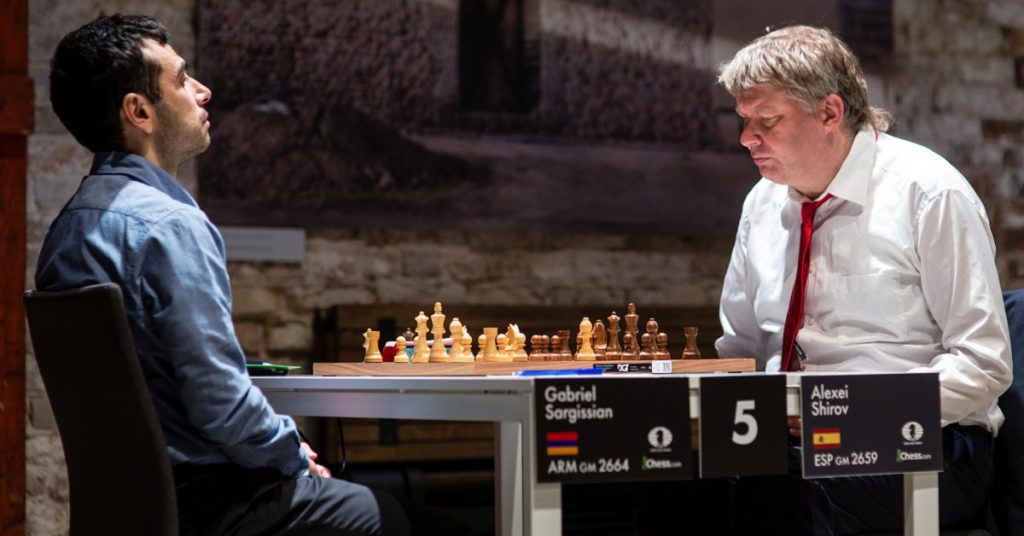
The most senior player at the top boards, Alexei Shirov, drew with Gabriel Sargissian. Both ended on 7/11. The game followed a very sharp line in the Botvinnik variation of Semi-Slav Defence. The opponents never left the book, and the game was drawn by a perpetual check just like in the encounters Kuzubov – Shirov and Fier – Aditya, to name a few.
In an interview following the game, Alexei Shirov said that overall he is satisfied with his performance, noting that he was lucky to get a draw in several games where he was weaker. With this result, Shirov was the last to qualify for the 2022 Grand Prix series.
Among other players who entered the final round with 6.5 points and who stood serious chances to qualify for the Grand Prix – Bogdan-Daniel Deac, Andrey Esipenko, David Anton, Samuel Sevian, David Howell and Vincent Keymer all drew their games, ending on 7/11. Their final standings now depended on the strength of their tiebreaks.
Levon Aronian drew his last game in the Grand Swiss, playing as Black against Yuriy Kryvoruchko. With 6.5/11, this isn’t a bad score bearing in mind the field, but the tournament didn’t go well for Aronian. By Round Seven, he had one victory and five draws. Then came a defeat at the hands of Andrei Volokitin, throwing Aronian to the middle of the scoreboard, far away from where many expected him to be. He then made two victories before drawing the final game, but that wasn’t enough to create chances for any of the spots leading to the Candidates or the Grand Prix.
The only woman to compete in the open section, Aleksandra Goryachkina, finished the tournament in the middle of the scoreboard with 5/11.
The Women’s Event
On the top board, Zhu Jiner was White against compatriot Lei Tingjie, who had already secured first place the day before. In the Morphy Defence of the Ruy Lopez, for quite a long time did the opponents follow the game Bologan – Kosteniuk (2015), which was won by White. The winner of the tournament deviated on move 16 but also ended up in a considerably worse position. Most likely, Zhu could have achieved much more than an equal bishop ending with a doubled extra pawn she ended up with. Both players tried their luck by advancing their pawns on the kingside but had to give their bishops for the other’s pawn, ending in a drawn pawn endgame. With 7.5/11, Jiner ended on the shared 2-3rd place and qualified for the women’s Grand Prix.
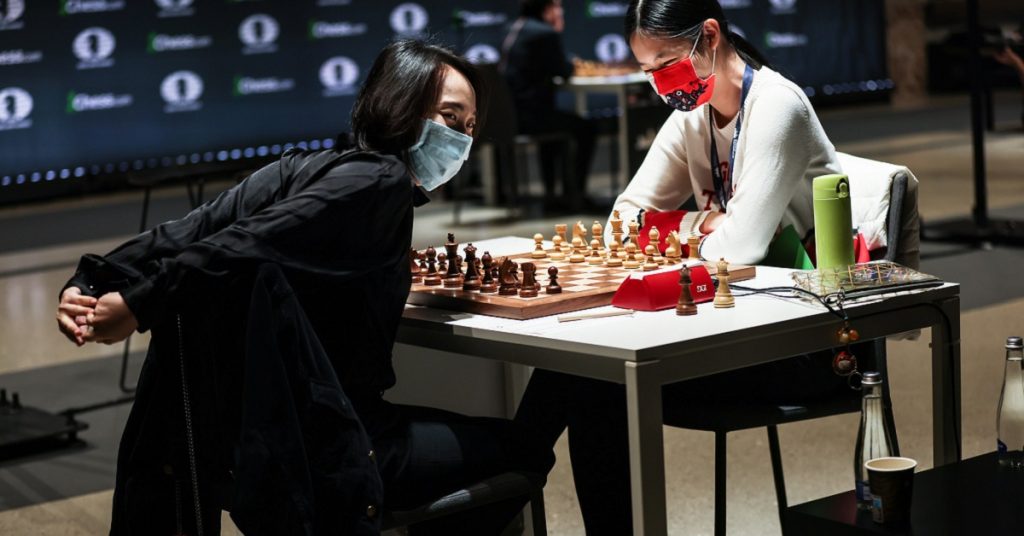
Mariya Muzychuk had a relatively quick draw with Harika Dronavalli on board two. In the Scotch Four Knights, Black managed to equalise quickly and kept the balance all the way to the rook endgame when the two agreed on a draw. Both finished on 7/11 and qualified for the women’s Grand Prix cycle.
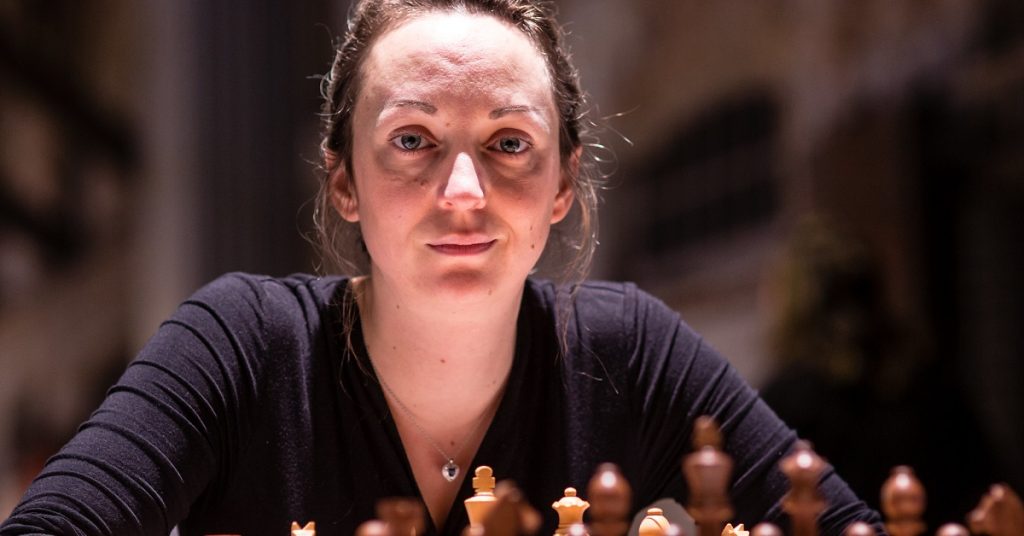
Elisabeth Paehtz was playing for the GM title today. As White on board three, she was up against Bibisara Assaubayeva. In a long theoretical line of Grünfeld Defense, Black made a mistake on move 19 and fell in a positional bind. To make things worse Bibisara committed a fatal error five moves later and Elizabeth seamlessly converted her advantage. This was Paehtz’s final norm before having the right to claim the title of Grandmaster.
“This was a tournament of my life… My main aim was to qualify for the Grand Prix, and for this reason today I didn’t want to take any risks in the opening.” Luckily, the game went her way and the German achieved her key goal in style, adding a GM norm to it.
The tournament ended on a sour note for Deysi T. Cori, who – after three defeats scored six wins and a draw, but lost the final game to Olga Badelka with black pieces. Olga did a much better job in the Classical Variation of the Pirc Defence grabbing initiative from the onset, thanks to taking control over the light squares. On her 20th move, Black made a costly mistake and had to give up two knights for a rook. Cori tried every possible chance in the final portion of the game, but Bedelka coordinated her knights, plucked Black’s pawns and forced her opponent to resign.
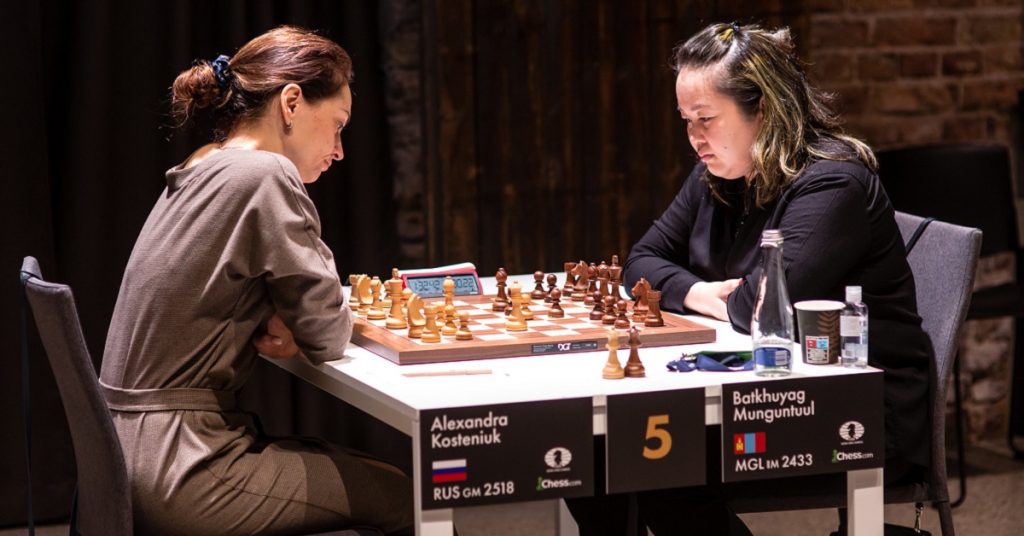
Former Women’s World Champion and this year’s winner of the inaugural Women’s Chess World Cup Alexandra Kosteniuk drew as White with Batkhuyag Munguntuul, ending the tournament on 6.5 points. Lela Javakhishvili defeated compatriot Nino Batsiashvili, finishing on 7/11.
On board 24 in the women’s section, Jesse February, one of the leading South African players, scored her first and only draw in the tournament after 10 lost games. Playing as White, February (rated 1857) had a significantly better position against a 500-points higher-rated Russian IM Alina Bivol (2377). In a completely winning endgame with queens on the board, February blundered in time trouble and gave her opponent a chance to escape with a draw.
